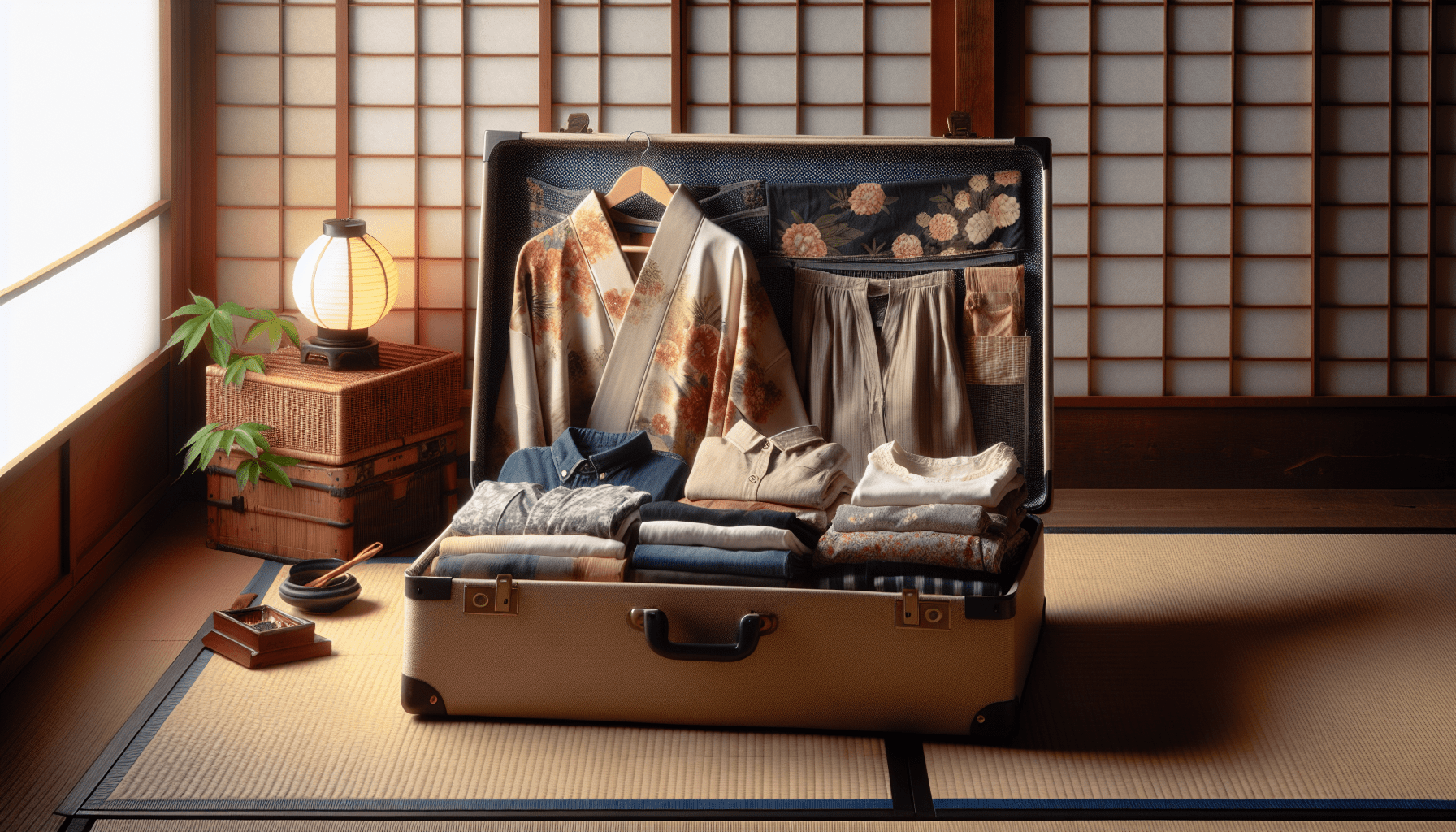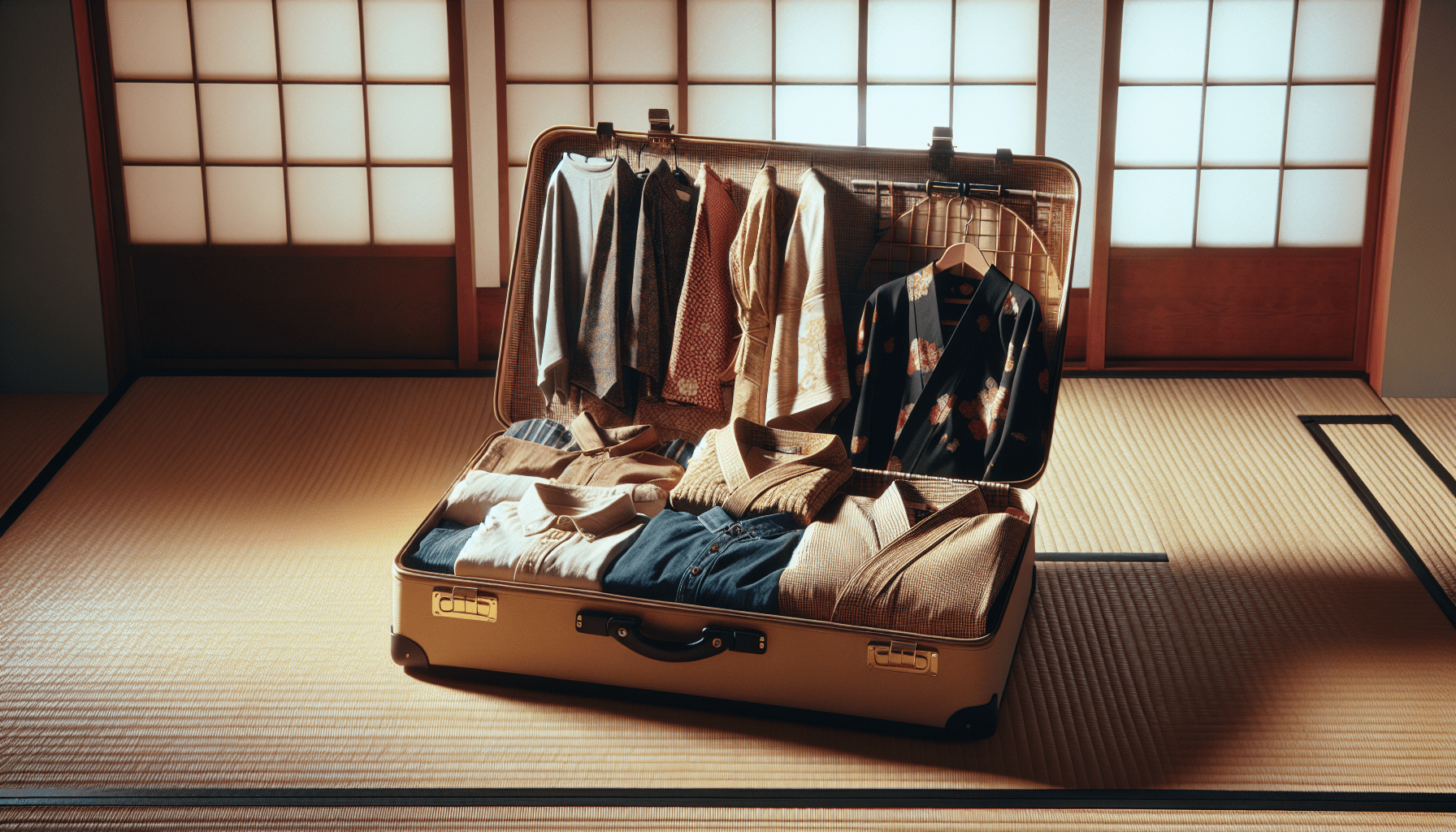BAGAIL 8 Set Packing Cubes Luggage Packing Organizers for Travel Accessories-Cream
$18.09 (as of November 20, 2024 15:23 GMT +00:00 - More infoProduct prices and availability are accurate as of the date/time indicated and are subject to change. Any price and availability information displayed on [relevant Amazon Site(s), as applicable] at the time of purchase will apply to the purchase of this product.)Exploring Japan’s vibrant culture and breathtaking landscapes is a dream for many travelers, but it’s essential to be mindful of your clothing choices when packing for your trip. Japan’s fashion norms often lean toward the conservative side, favoring classic cuts and neutral colors, which may be quite different from what you’re used to. As a tourist, wearing the wrong attire can make you stand out and even cause some discomfort, especially during the sweltering summer months. By following a few simple guidelines, you can ensure that you blend in seamlessly with the locals, stay comfortable, and avoid any unintended faux pas. Pack breathable, loose-fitting clothes, choose practical footwear, and be cautious with garments that might carry unintended meanings. This way, you can fully enjoy your Japanese adventure without any wardrobe worries, fitting right in while staying stylish and comfortable. Have you ever stopped to think about how the clothes you pack might impact your travels, especially when visiting a culturally unique destination like Japan? Whether you’re a seasoned globetrotter or planning your first trip to the Land of the Rising Sun, packing the right wardrobe can make or break your experience. With influences ranging from traditional tea ceremonies to contemporary pop culture, Japan’s fashion norms are as eclectic as they are specific.

Shop These Accessories for a Comfortable Trip
Why Tourists Need To Be Cautious Of The Clothing They Pack On A Trip To Japan
Japan’s Unique Fashion Culture
Japan is revered for its one-of-a-kind culture, from its traditional tea ceremonies to its colorful modern anime. Unsurprisingly, the country’s uniqueness also extends to its fashion norms. Japan is the birthplace of styles such as Lolita fashion and Decora, yet when it comes to everyday wear, locals tend to dress fairly conservatively, favoring classic cuts and neutral colors. This makes it a bit tricky for tourists to pack an appropriate travel wardrobe.
Unless you’ve been to Japan before, it can be difficult to determine which clothes will blend seamlessly into the streets of Tokyo and Kyoto and which will highlight you as an obvious foreigner. Beyond sticking out, some clothing items may be impractical for sightseeing in Japan, even if they work fine back home.
Local Norms and Expectations
A few simple guidelines will ensure you’re both comfortable and stylish (or “oshare” in Japanese) during your trip. Japanese people are generally meticulous about their dress code and what may seem normal elsewhere might be frowned upon here. So, what works and what doesn’t?
Cultural Sensitivity: Your Japan-Inspired Clothing Could Offend Locals
You’ve likely seen random English (and sometimes French) words and phrases on T-shirts and bags in Japan. They often seem out of place and nonsensical, but locals find them fashionable simply because the text looks exotic. A similar trend exists in Western countries, where Japanese phrases are printed on sweatshirts and other items, signaling an interest in Japanese culture — even if the wearer doesn’t fully understand the text.
If you’re considering packing clothing with Japanese text, be cautious unless you’re sure of the meaning. Wearing an offensive or nonsensical phrase could result in embarrassment. Likewise, think twice about clothing featuring various Chinese characters unless you’re fluent in the language.
Staying Cool: The Wrong Clothes Could Put You at Risk of Heatstroke
Japan’s summers can be intensely hot, making it crucial to pack attire that will keep you cool. Each year, thousands of people visit hospitals due to heatstroke, and approximately 1,300 people die from it annually.
If you’re visiting Japan during the summer, avoid tight and stretchy garments. Loose-fitting, breathable fabrics like cotton and linen are ideal. While exposing a lot of skin is generally not the norm, you can still dress for the heat by choosing flowy T-shirts and blouses. Avoid dark-colored clothes and fabrics such as wool, silk, polyester, and acrylic, which can trap heat.
One common Japanese accessory is a UV-blocking umbrella, which can reduce heat stress by 5.4 degrees Fahrenheit and mitigate sweat by 20%.
Footwear Matters: Choosing the Right Shoes
While Japanese locals are stylish, they prioritize practicality, especially when it comes to footwear. You don’t need fancy shoes to fit in. For instance, spindly high heels are uncommon and can cause unnecessary discomfort on sightseeing trips. Similarly, men don’t need dress shoes to look good; clean sneakers, flats, or supportive loafers work in most settings.
You should also be cautious with sandals and open-toed shoes if you plan to take public transportation. The rush-hour commuter trains get extremely crowded, making it easy for someone to step on your feet. Also, pack shoes that are easy to slip on and off as many establishments, such as izakayas, traditional restaurants, onsens, and temples, require you to remove your shoes upon entry.
Revealing Clothes May Attract Unwanted Attention
Fitting more outfits into your carry-on may seem easier with skimpy tops and shorts, but this isn’t the best idea for Japan. Revealing clothing, particularly for women, isn’t standard in Japanese fashion and can attract unwanted attention. In areas known for nightlife and love hotels, you might receive some unwelcome comments or stares.
Moreover, short skirts and dresses pose another risk: upskirt photography. Crowded spots like escalators and trains are where “chikan” (Japanese for “pervert”) may try sneaking photos up women’s skirts without consent. Wearing shorts or opaque tights underneath can offer an extra layer of protection.
Athleisure Might Make You Stand Out
Athleisure might be your go-to casual wear, but in Japan, you’ll stand out as a tourist. Sports bras, jerseys, basketball shorts, leggings, and crop tops might be common in many countries, but in Japan, these items are generally reserved for gym wear.
Japanese casual attire tends to include pieces like blouses, wide pants, long skirts, basic T-shirts, simple sweaters, and button-up shirts. Athleisure-adjacent pieces such as sweatpants and hooded sweatshirts may be worn but styled more conservatively.
Packing Tips for Different Seasons
Japan experiences four distinct seasons, and your packing list will vary depending on the time of year you visit.
Spring (March to May)
Spring in Japan is famous for its cherry blossoms, and the weather is generally mild. Light layers such as long-sleeved shirts, cardigans, and a light jacket will keep you comfortable. Avoid heavy coats as temperatures can rise quickly.
Summer (June to August)
Summers are hot and humid, so breathable, lightweight fabrics like cotton and linen are essential. Opt for loose-fitting clothes and pack a UV-blocking umbrella to stay cool.
Autumn (September to November)
Autumn brings cooler temperatures and beautiful foliage. Layers are key; consider packing T-shirts, long sleeve tops, and a medium-weight jacket. A pair of sturdy walking shoes can also come in handy for exploring the countrysides.
Winter (December to February)
Winters can be quite cold, especially in northern regions. Warm layers, including thermal wear, sweaters, and a heavy coat, are necessary. Don’t forget gloves, scarves, and warm footwear.
Shop These Accessories for a Comfortable Trip
Practical Tips for Packing
Here are some general tips to help you pack effectively for your trip to Japan:
| Season | Recommended Clothing | Footwear | Additional Items |
|---|---|---|---|
| Spring | Light layers, long-sleeved shirts, cardigans | Comfortable walking shoes | Light jacket |
| Summer | Loose-fitting, breathable fabrics | Lightweight sandals or sneakers | UV-blocking umbrella |
| Autumn | Layered tops, medium-weight jacket | Sturdy walking shoes | Scarf |
| Winter | Thermal wear, sweaters, heavy coat | Warm boots | Gloves, ear mitts |
Consider Laundry Options
When planning your wardrobe, think about doing laundry during your trip. Many hotels offer laundry services, and laundromats are common in larger cities. Packing fewer items but washing them can save space and reduce your luggage weight.
Plan for Cultural Activities
Consider the cultural activities you plan to participate in. Visiting temples and shrines may require more conservative attire. Participating in a tea ceremony? Opt for more traditional and respectful clothing. Going to an upscale restaurant? A casual but neatly put-together outfit will do.
Pack Versatile Items
Opt for versatile clothing items that can be mixed and matched easily. This not only saves space in your luggage but also ensures you’re prepared for different activities and settings. Basic colors like black, white, beige, and navy can be paired with nearly anything.
Travel Capsule Wardrobe
A travel capsule wardrobe can simplify your packing. Here are some essentials:
- 2-3 Long-sleeved shirts: For layering in cooler months.
- 2-3 T-shirts or tops: Comfortable and can be dressed up or down.
- 1-2 Pairs of jeans or trousers: Versatile and always in style.
- 1 Skirt or dress: Easy to dress up for nicer occasions.
- 1 Light jacket: For layering during chilly evenings.
- Comfortable footwear: Sneakers for walking and flats for evenings out.
Embrace Local Fashion
Part of the excitement of traveling is embracing and adapting to local cultures. Observe how locals dress and take inspiration from their fashion sense. While you’ll want to maintain your personal style, blending in can enhance your experience and minimize misunderstandings.

Conclusion: Blending Comfort with Cultural Sensitivity
When you pack for Japan, you’re not only preparing for weather and comfort but also considering a culture rich in etiquette and norms. By understanding and respecting Japan’s unique fashion culture, climate considerations, and practical footwear needs, you can ensure a comfortable and memorable journey. It’s not about abandoning your style but about blending it thoughtfully with local customs to enhance your experience and interactions.
Embrace the adventure, enjoy the rich tapestry of Japanese culture, and pack wisely to make the most of your time in this fascinating country. Safe travels and happy packing!
Shop These Accessories for a Comfortable Trip






